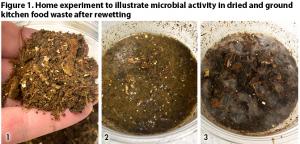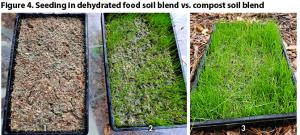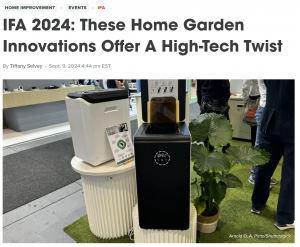
Dried and ground food waste (1), Rewetted material (2), Mold resulting from microbial activity (3). Photos by Sally Brown
GEME calls for industry standards to address composting market chaos. Mislabeled products and subpar outputs damage reputation.
CA, UNITED STATES, September 16, 2024 /EINPresswire.com/ -- The Growth of Home Electric Composters
The rise in environmental consciousness has spurred many individuals to embrace sustainable lifestyles, leading to increased popularity of home composters for managing kitchen waste. According to the 2023 BioCycle Nationwide Survey, 14.9 million U.S. households now have access to food waste collection through 400 programs across 710 communities.
Since 2021, there has been notable growth in these programs, supported by regulations such as California's S.B. 1383 and New York City's food waste collection mandates. These policies align with government goals to reduce environmental impact and promote organic waste recycling. Consequently, home electric composters have gained traction.
The Confusing Landscape of Electric Composters
Home electric composters claim convenience and efficiency, allowing for easy indoor composting without complex knowledge or experience. However, as the market for these devices expands, skepticism has emerged in composting forums and environmental magazines.
Experts and seasoned composters have highlighted the confusion in the current market. Ron Alexander, author of BioCycle, conducted experiments showing that dehydrated food samples are prone to mold and attract flies. In plant growth tests, soil mixtures from dehydrated food lacked seed germination and produced strong odors, while composted soil mixtures supported healthy grass growth. DNA sequencing revealed no measurable microbial DNA in dehydrated food samples, indicating a lack of microbial stabilization. Analysis of these materials also showed high electrical conductivity, elevated sodium and chloride content, low moisture levels, and unsuitable pH values, which undermine their effectiveness as soil amendments.
Professor Sally Brown from the University of Washington's School of the Environment noted that some home electric composters fail to produce usable compost. Using the output of these appliances on indoor plants can result in strong odors, mucus, and plant death. True composting requires specific environmental conditions and microbial action. These appliances merely stabilize food waste by removing moisture; when water is reintroduced, decomposition resumes, often leading to unpleasant results. For instance, testing of the Mill composter showed that its output, when mixed into soil in large amounts, required extensive washing to remove excess salt and negatively affected plant germination. The output only becomes useful after prolonged transformation.
Some appliances, like Lomi and FoodCycler, have been criticized for their misleading use of the term "compost." A report in The Guardian revealed that Lomi admitted its product output differs significantly from real compost, while FoodCycler refers to its by-products as "food residue," which, if not properly composted before soil application, may lead to issues such as mold or attracting pests. Ron Alexander's tests further confirm that these appliances' outputs fall short of true composting standards, potentially misleading consumers and creating inappropriate comparisons with actual compost.
The Dilemma of GEME Composter
GEME, a prominent player in the indoor composter market, faces challenges due to market skepticism. Some users wrongly equate GEME's composters with dehydrators, questioning their effectiveness.
GEME's chief scientist, Professor Marcoena from the University of Liège, asserts that GEME's composting method is an accelerated biodegradation process using microbial agents, aligning with traditional composting principles. GEME's innovation, Kobold, employs aerobic composting. The GEME machine creates optimal conditions for kitchen waste composting by providing aeration, timely stirring, and heating functions. Kobold's acid-tolerant Bacillus bacteria and sulfur bacteria thrive in specific conditions, ensuring stable, mature compost without odor, meeting true compost standards.
GEME's Efforts to Address Market Challenges
GEME is actively working to address the current market challenges. Athom, a software engineer previously involved in Garbage Collection at TikTok, is now leading the development of a Large Scale Distributed Compost Trading Network. This platform allows GEME users to sell surplus fertilizer and enables buyers to purchase high-quality fertilizer at lower prices than the market rate.
Athom, humorously referring to himself as a cross-dimensional scavenger, emphasizes the need for a macro perspective on the composting industry. He views the goal of sustainable lifestyles and food health as the industry's ultimate objective, with convenient kitchen waste management being a means to that end. GEME's microbial agents were developed with long-term goals in mind.
Home composters often produce more fertilizer than households need. GEME's platform facilitates the sale of excess fertilizer at lower prices, benefiting both producers and consumers. It promotes direct transactions, reducing the role of middlemen and lowering prices. The platform also features a positioning system to connect buyers with nearby sellers, cutting transportation costs and reducing carbon emissions.
GEME is also excited to introduce a new model, Terra 2. Recently unveiled at IFA Berlin 2024, Terra 2 has garnered significant attention from both audiences and media. The compact and affordable design of Terra 2 is tailored to fit various kitchen layouts, making it more accessible for a wider range of households. The launch of Terra 2 is planned for the first quarter of 2025, and GEME hopes this model will further encourage broader participation in composting and support the company's mission to promote sustainable waste management solutions.
Call for Industry Standards
The composting market is currently chaotic, with some devices misleadingly labeled as "composters" and their outputs not meeting true compost standards. This mislabeling damages the reputation of real compost and hinders industry development. As noted by Ron Alexander, the use of terms like "compost" for dehydrator outputs or marketing these devices as "composters" without clear standards misleads consumers and impedes market growth.
GEME advocates for the establishment of industry standards to define genuine compost products' characteristics and performance. Standards should cover microbial decomposition time, reduction of volatile solids, pathogen and weed seed inhibition, carbon stabilization effects, and benefits to plant growth. Specifications should also clarify the functions and applications of devices incorrectly labeled as "composters" to prevent consumer misinformation.
Strengthening market supervision is crucial to ensure compliance with these standards and protect consumer rights and industry reputation.
By calling for industry standards, GEME aims to standardize the market, foster fair competition, drive healthy industry development, provide high-quality compost products, and contribute positively to environmental protection and sustainable development.
Joey
GEME
hello@geme.bio
Visit us on social media:
Facebook
Instagram
YouTube
Legal Disclaimer:
EIN Presswire provides this news content "as is" without warranty of any kind. We do not accept any responsibility or liability for the accuracy, content, images, videos, licenses, completeness, legality, or reliability of the information contained in this article. If you have any complaints or copyright issues related to this article, kindly contact the author above.
© 2025 Benzinga.com. Benzinga does not provide investment advice. All rights reserved.
Trade confidently with insights and alerts from analyst ratings, free reports and breaking news that affects the stocks you care about.

